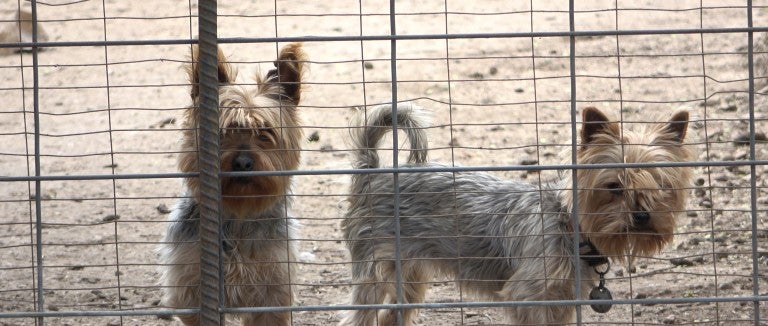Update 3/15/2022: President Biden signed the appropriations package into law.
Humane advocates often look to the passage of animal-friendly legislation as the strongest measure of progress in our work at the federal level, and clearly, good laws are important. But a nation that cares for animals needs to prove that in its spending commitments, too. For that reason, we work to secure strong animal protection laws and to shape congressional funding priorities for key federal agencies.
With the federal government’s fiscal year 2022 appropriations bill set for a vote in the House and Senate, we can see that our broad-gauge approach has again made a difference.
It is a difference we can measure through increased funding for programs to build out sheltering options for survivors of domestic violence and their pets, and to strengthen the USDA’s enforcement capabilities on horse soring. It is something we can see in congressional prohibitions on the use of USDA funds to inspect horse slaughter plants in the U.S. (keeping those operations shuttered), and encouragement of non-lethal approaches including immunocontraception for the management of wild horses and burros on our western rangelands.
These elements in the package illustrate a fundamental point: We must press for laws that benefit animals, but to have a real effect, we’ve also got to persuade lawmakers to use the power of the purse to ensure that federal agencies pursue implementation, regulation and enforcement efforts consistent with the spirit of those laws. Whether we’re trying to make sure that people seeking to flee domestic violence situations with their cherished animals have somewhere safe to go, that the USDA has the resources it needs to prevent the suffering of animals in the Tennessee walking horse industry, or that the Bureau of Land Management puts immunocontraception at the heart of wild horse and burro management, we need to make sure that the right levers of government are pulled, across the host of federal agencies concerned.
We have been working on these crucial gains since early 2021. For a year, our staff members regularly met with legislators to respond to their questions, share our perspective and supporting data, and encourage them to champion these measures. Finally, we took a close look at opportunities to strengthen funding for specific programs or to urge reform or course change through congressional directives.
There is other good news for animals in the package, which includes many other gains for which we fought long and hard. Congress pressed the USDA not merely to abandon a misguided enforcement approach involving “teachable moments”—which were actually a way for inspectors to avoid documenting problems at puppy mills, roadside zoos and other regulated facilities—but to institute a stronger compliance regime. It also increased funding for the Veterinary Medicine Loan Repayment program, which encourages veterinarians to practice in underserved areas.
In addition, congressional appropriators reinforced a trophy-hunting provision directing the Fish and Wildlife Service to report on its procedures for evaluating elephant and lion trophy import permit applications, and specifically whether granted permits are based on well-founded evidence that exporting countries adequately protect these species. In another good move for wildlife, they increased funding to help the critically endangered North Atlantic right whale and other declining and trafficked species. They reinstated provisions requiring animal welfare inspections at USDA’s own Agricultural Research Service laboratories and preventing licenses of “Class B" dealers (notoriously dodgy in their animal dealing practices) and also urged the Biden administration to extend its commitment to the development of alternatives to animal research and testing.
We expect President Biden to sign the appropriations package into law almost immediately after the House and Senate vote. That pen stroke will mark the end of a lengthy and complicated workstream for our public policy team. But it will also mean that we have succeeded in our latest efforts to elevate the welfare and protection of animals through the legislative process, and in doing so, to make this nation a more humane one.
Sara Amundson is president of the Humane Society Legislative Fund.



